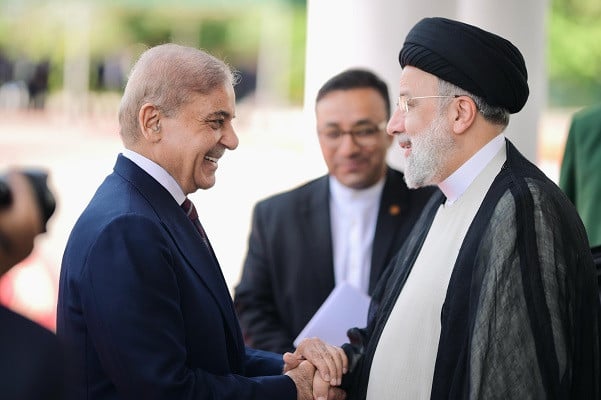ISLAMABAD:
The foreign office on Friday said Pakistan was confident its ties with Iran won’t affect the relationship with “friends and partners” including the United States as it stressed that the country does not believe in “zero-sum” relationships.
Iranian President Ebrahim Raisi undertook a three-day visit to Pakistan recently and both countries agreed to deepen their cooperation in diverse areas including expediting talks on free trade agreement as well as gas pipeline.
The US has repeatedly warned Pakistan of potential risks of getting close to Iran.
At the weekly briefing, Foreign Office Spokesperson Mumtaz Zahra Baloch insisted that Pakistan does not believe in zero-sum relationships.
“Expansion of our relations with one country should not be considered as coming at the expense of our relationship with another,” she stressed.
“Pakistan is confident that its relationship with its friends and partners, including the United States, are robust enough to move forward on their own merit, and notwithstanding any other relationships that Pakistan has with other countries in our national interest,” she added.
She noted that Pakistan had trade relations with its neighbour Iran. “And we have, as I mentioned earlier, we have a Preferential Trade agreement between Pakistan and Iran. The border regions of Pakistan and Iran benefit from local trade and this trade takes place mostly in barter form.”
“You would recall, there are border markets, these are sustenance markets to help the local traders. This basically helps the economy of the poor regions along the border of Pakistan and Iran,” the spokesperson said.
Also read: Pakistan rejects ‘provocative’ statements, claims by Indian leaders on IIOJK
She added that Pakistan and the United States have a robust dialogue and several channels of communication and Islamabad would continue to engage with them and explain the importance that Pakistan accords to its relations with its neighbours and the need for this cooperation so as to have the Pakistan-Iran border, as a border of peace, security and prosperity.
On the Iran-Pakistan gas pipeline, the spokesperson said Pakistan would pursue the project in its own national interests.
“Pakistan has energy needs. Pakistan will take decisions on the basis of its national interest in fulfilling its energy requirements, taking into account the international environment, taking into account the UN sanctions, if any, and issues relating to trade with other countries, including in the energy domain,” she said.
The multibillion-dollar project returned to the spotlight after Pakistan recently committed to commencing work on its side of the border. The US has cautioned that the project carries the risk of provoking sanctions.
Pakistani officials, however, are adamant that the question of sanctions would arise only once the pipeline is connected with Iran. At this stage, officials say, Pakistan is only laying the pipeline on its side of the border.
Meanwhile, Pakistan has voiced grave concerns over the discovery of mass graves at two major hospitals in Gaza that shocked the human conscience.
“Pakistan joins the call by the United Nations for a clear, transparent and credible investigation of mass graves and the massacre of men, women and children by the Israeli occupation forces. Pakistan vehemently condemns Israel’s barbarianism and its war crimes against the people of Gaza,” Baloch said.
“We underline the urgency of an unconditional ceasefire to protect civilians from further carnage. An independent and impartial investigation must be held to ascertain the facts, fix responsibility and punish the perpetrators of war crimes and crimes against humanity in Gaza.
“We urge the international community, especially the backers of Israel, to take urgent measures to bring an end to the war on the people of Gaza, to lift the siege, to protect civilians, facilitate humanitarian assistance and to hold to account the perpetrators of the Gaza genocide,” the spokesperson said.







